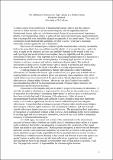IV - The infliction of subsistence deprivations as a perfect crime
Abstract
Genuine acknowledgement of a fundamental human right entails prohibiting and classifying as a violation behaviour that predictably deprives persons of the object of the right. There is widespread acknowledgement of a fundamental human right to subsistence. There is also widespread agreement that much severe poverty should be attributed to persons’ being actively deprived of the means of subsistence. However, the causal chains that result in these subsistence deprivations are generally of a scale and complexity that cannot be captured by either of the two main accounts of human rights violations, the interactional or the institutional accounts. Thus, while the plunder or destruction of persons’ means of subsistence are widespread, they do not generally take either an interactional or an institutional form. I argue that an adequate account of fundamental human rights should acknowledge a category of structural human rights violations, and that many subsistence deprivations should be classified as a structural violation, responsibility for which is shared by the international community. The principal juridical implication of recognition of a structural violation is that it poses a deep challenge to the moral legitimacy of existing global and domestic legal, social and economic structures themselves, insofar as they have failed to adequately recognize a fundamental human right.
Citation
Ashford , E 2018 , ' IV - The infliction of subsistence deprivations as a perfect crime ' , Proceedings of the Aristotelian Society , vol. 118 , no. 1 , pp. 83-106 . https://doi.org/10.1093/arisoc/aoy004
Publication
Proceedings of the Aristotelian Society
Status
Peer reviewed
ISSN
0066-7374Type
Journal article
Collections
Items in the St Andrews Research Repository are protected by copyright, with all rights reserved, unless otherwise indicated.

